We’ve all watched our favorite vocalists sip mysterious concoctions before taking the stage, and there’s good reason behind this ritual. Singer’s tea isn’t just another herbal blend – it’s a carefully crafted remedy that’s been protecting vocal cords for generations. This soothing elixir combines time-tested ingredients that reduce inflammation, coat the throat, and keep your voice in peak condition.
Professional singers and vocal coaches swear by this golden blend of honey, lemon, ginger, and healing herbs. Whether you’re preparing for a big presentation, battling seasonal throat irritation, or simply want to pamper your vocal cords, this tea delivers results you can feel with every sip.
What makes our singer’s tea recipe special is its perfect balance of therapeutic ingredients that work together to create a powerhouse drink. We’ll show you how to create this vocalist’s secret weapon using simple pantry staples that transform into liquid gold for your throat.
What Is Singer’s Tea
Singer’s tea represents a time-honored herbal remedy specifically designed to protect and heal the vocal cords. We define this therapeutic beverage as a carefully balanced blend of natural ingredients that work together to reduce throat inflammation and maintain optimal vocal health.
The foundation of authentic singer’s tea combines four essential components: honey for its antibacterial properties, fresh lemon juice for vitamin C and acidity balance, ginger root for anti-inflammatory effects, and various healing herbs that target throat irritation. These ingredients create a powerful synergy that soothes the delicate tissues of the vocal tract.
Professional vocalists have relied on this remedy for centuries to prepare their voices before performances and recover afterward. We recognize singer’s tea as more than just a warm beverage—it serves as a preventive measure against vocal strain and a therapeutic treatment for existing throat discomfort.
The tea’s effectiveness stems from its ability to coat the throat with protective moisture while delivering active compounds that reduce swelling and irritation. We find that regular consumption helps maintain vocal flexibility and prevents the dryness that can lead to vocal cord damage.
Unlike commercial throat remedies that may contain artificial ingredients or numbing agents, singer’s tea relies entirely on natural healing properties. The combination provides immediate relief while supporting long-term vocal health through gentle, consistent care of the throat tissues.
Health Benefits for Vocalists
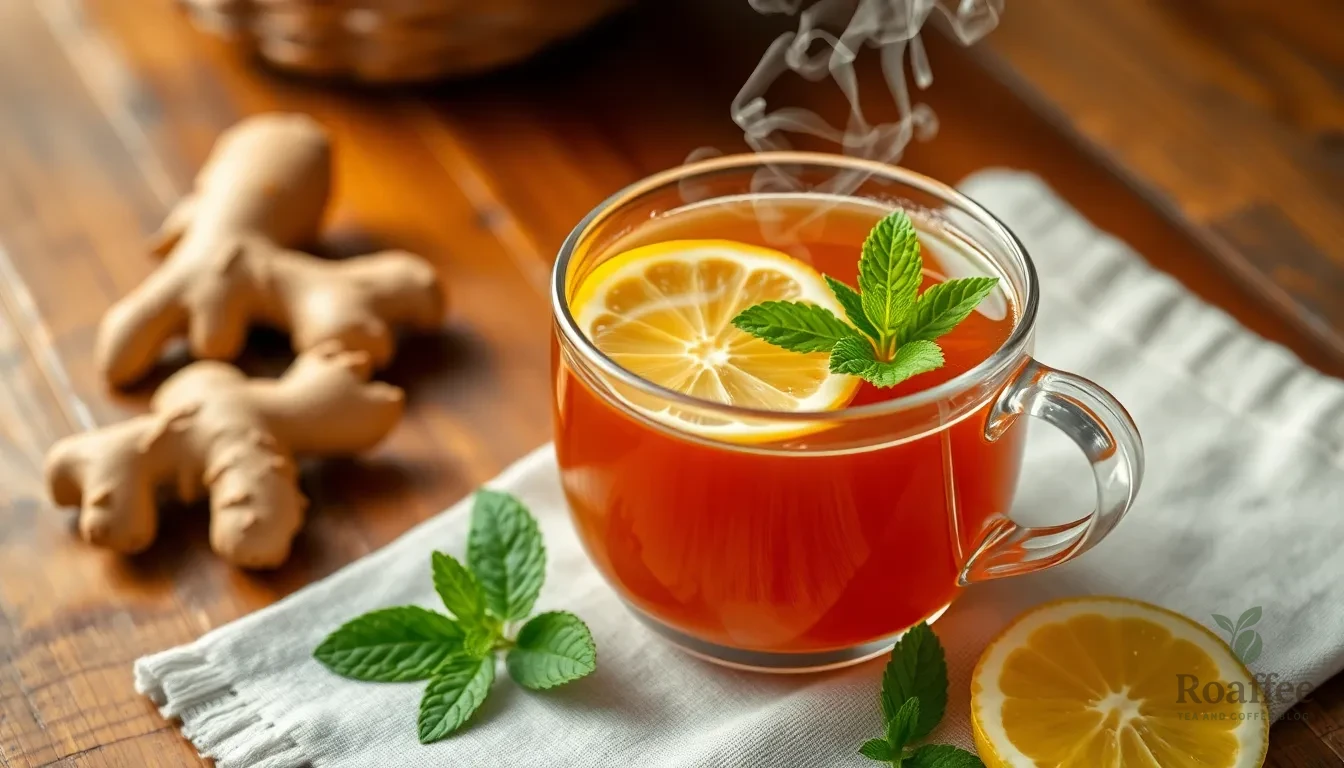
Professional singers and vocal performers rely on our carefully crafted tea blend to maintain optimal throat health throughout their careers. The anti-inflammatory properties of ginger work directly on irritated vocal cords, reducing swelling that can compromise voice quality and range. Peppermint provides an immediate cooling sensation that helps clear throat congestion while supporting respiratory function.
Licorice root stands out as particularly beneficial for vocalists because it soothes irritated mucous membranes throughout the vocal tract. This natural ingredient creates a protective coating that shields sensitive tissues from further irritation during extended vocal use. Chamomile contributes calming properties that reduce overall inflammation while promoting relaxation of throat muscles.
| Vocal Health Benefit | Primary Ingredients | Time to Effect |
|---|---|---|
| Throat soothing | Ginger, licorice root, chamomile | 5-10 minutes |
| Mucus reduction | Peppermint, thyme | 10-15 minutes |
| Inflammation relief | Ginger, chamomile | 15-20 minutes |
| Vocal cord hydration | Honey, warm water | Immediate |
Honey serves dual purposes by coating the throat with moisture while delivering natural antibacterial compounds that protect against infections. This natural sweetener prevents the dryness that often leads to vocal cord strain and damage. Lemon juice adds essential vitamin C to support immune function while helping to cleanse the throat of accumulated mucus.
Regular consumption of our singers’ tea blend helps vocalists maintain clear, flexible voices even during demanding performance schedules. The warming effects of ginger and the cooling properties of mint create a balanced sensation that promotes optimal vocal cord function. Thyme contributes antimicrobial benefits that protect against throat infections commonly experienced by performers in close contact with audiences.
Hydration remains crucial for vocal health, and our warm tea blend delivers moisture directly to the vocal cords where it’s needed most. The combination of herbs works synergistically to reduce mucus production that can interfere with clear vocal projection. Unlike commercial throat sprays that may contain drying alcohol, our natural tea blend provides sustained moisture and healing compounds that support long-term vocal wellness.
Essential Ingredients
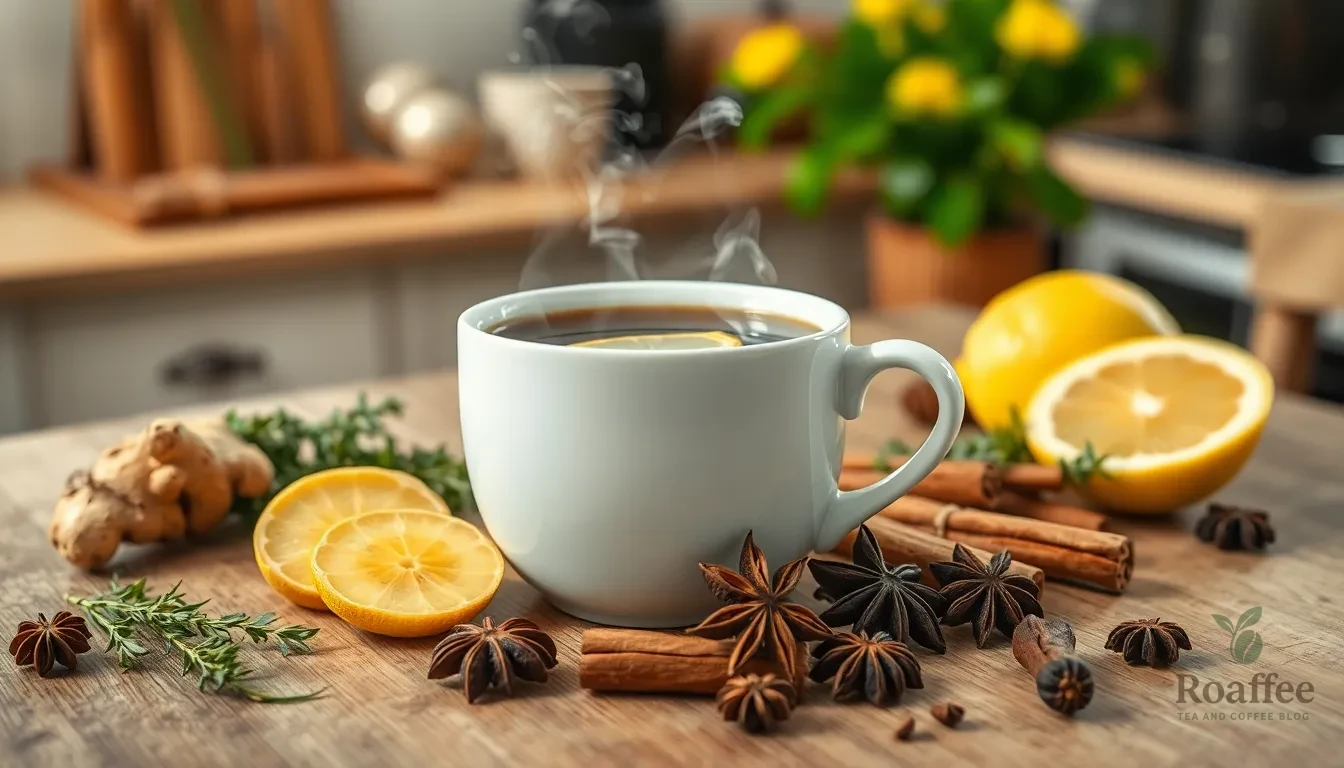
We need exact ingredients that work together to create this powerful vocal remedy. Our singer’s tea recipe combines carefully selected components that provide both immediate relief and long-term vocal protection.
Base Tea Selection
We start with a foundation that maximizes throat benefits while minimizing irritation. Plain hot water infused with herbs offers the most effective base for our singer’s tea. This approach avoids traditional tea leaves that can cause throat irritation and allows the medicinal properties of our herbs to shine through.
Fresh ginger root slices simmered in water for up to 45 minutes creates an exceptionally strong and therapeutic base. We use approximately 1 inch of fresh ginger root per 16 ounces of water. Some recipes incorporate black or green tea for their antioxidant properties and mild caffeine boost. But, herbal blends remain our preferred choice for their superior throat-soothing capabilities.
Honey and Natural Sweeteners
We rely on honey as our primary natural sweetener because it provides both taste enhancement and therapeutic benefits. Raw honey delivers antimicrobial and soothing properties that directly support vocal health. We use approximately 1 tablespoon of honey per serving and adjust to taste preferences.
Apple juice concentrate serves as an excellent complementary sweetener in some variations. This addition not only enhances flavor but also provides additional soothing effects for irritated throat tissues. We avoid artificial sweeteners that can cause throat dryness and interfere with the tea’s healing properties.
Throat-Soothing Herbs and Spices
We incorporate a blend of powerful herbs and spices that target exact throat and vocal cord needs. Fresh thyme provides antiviral and antibacterial properties while helping clear mucus from the vocal tract. We use 2-3 sprigs of fresh thyme per serving for optimal benefits.
Cinnamon sticks, whole cloves, and star anise pods work together to improve circulation in the vocal tract and deliver antimicrobial effects. These warming spices help break down congestion and support clear vocal production. We typically include one cinnamon stick, 2-3 whole cloves, and one star anise pod per batch.
Peppermint and chamomile flowers provide cooling relief for irritated throat tissues. Fresh lemon juice adds vitamin C and acts as a natural throat cleanser. We squeeze approximately 2 lemon wedges into each serving for optimal results.
Licorice root soothes mucous membranes and creates a protective coating for sensitive throat tissues. Optional cayenne pepper stimulates circulation and helps break mucus congestion. We add just a pinch of cayenne pepper for those who can tolerate the heat.
Equipment Needed
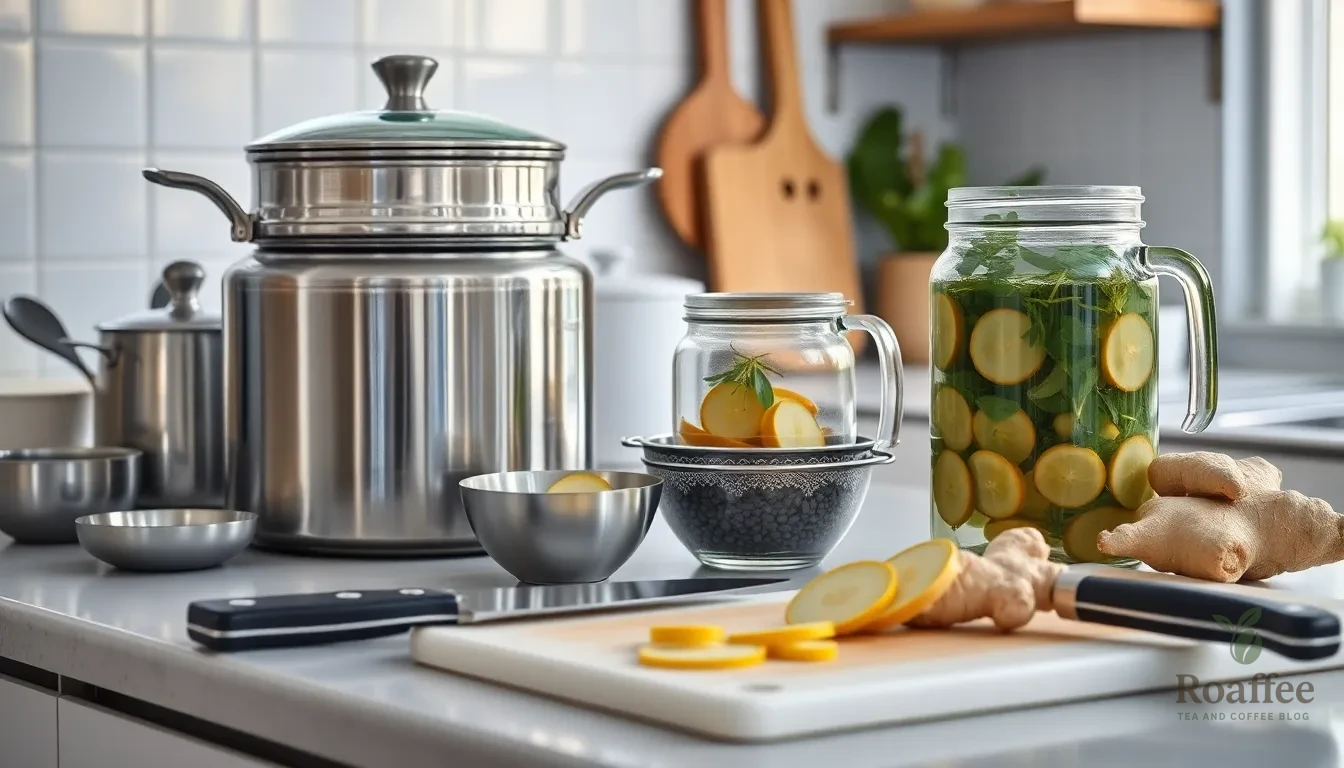
Creating the perfect singer’s tea requires only basic kitchen equipment that most home cooks already possess. We recommend gathering these essential tools before beginning your tea preparation to ensure a smooth brewing process.
Primary Brewing Equipment:
- Large saucepan or pot for boiling water (2-3 quart capacity works best)
- Teapot or large heatproof mug for steeping
- Tea strainer or fine-mesh infuser for loose herbs
- Wooden spoon for stirring ingredients
Preparation Tools:
- Sharp knife for slicing fresh ginger root
- Cutting board for ingredient prep
- Measuring spoons for precise herb portions
- Measuring cups for water quantities
Storage and Serving Items:
- Glass jar with tight-fitting lid for mixing and steeping
- Heat-resistant serving mugs or cups
- Small pitcher for honey mixing (optional)
The glass jar with lid serves a dual purpose in our brewing method. We use it both for combining ingredients and for the steeping process that allows flavors to develop properly. This sealed environment helps extract maximum therapeutic compounds from the herbs while preventing essential oils from escaping.
Your knife should be sharp enough to create thin ginger slices that release maximum flavor during brewing. Thicker slices require longer steeping times and may not provide the same intensity of beneficial compounds that make singer’s tea so effective for vocal health.
Most households already have these basic items available. The beauty of singer’s tea lies in its simplicity and accessibility using common kitchen tools rather than specialized equipment.
Instructions
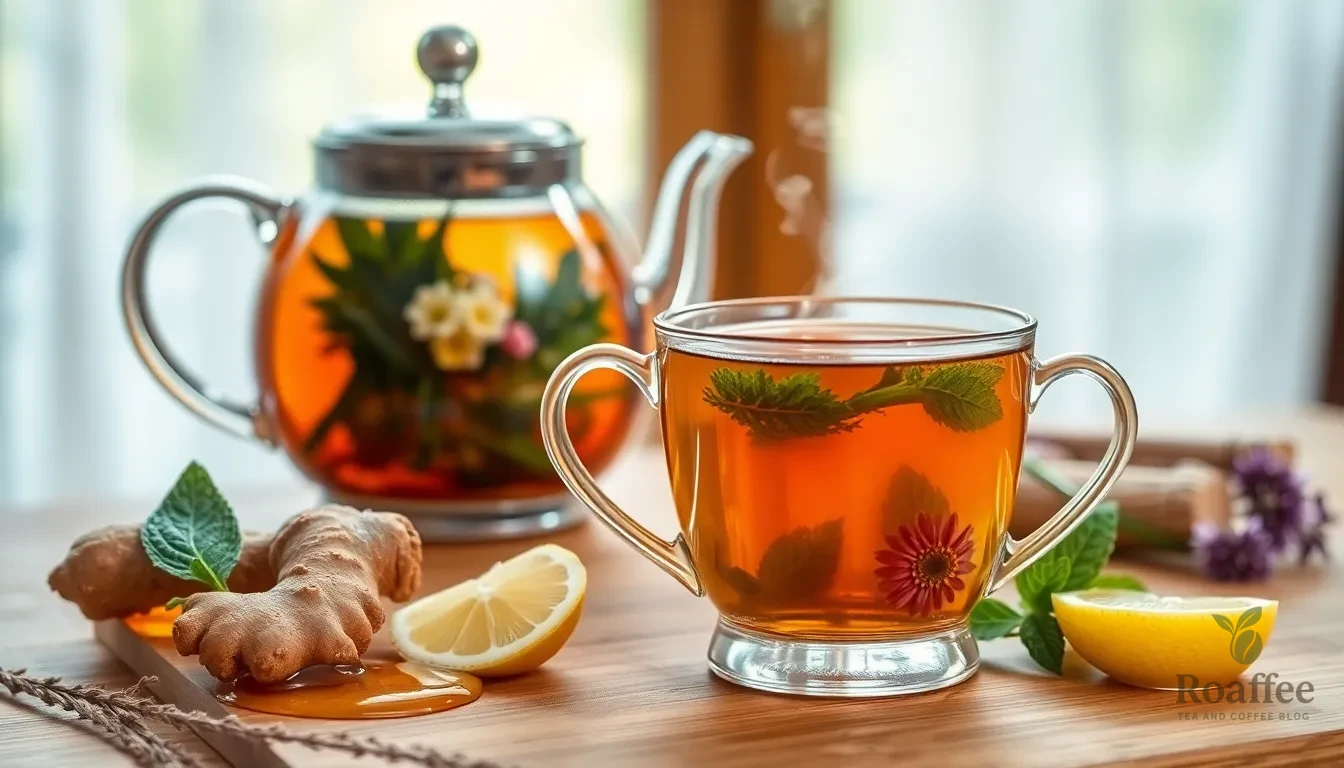
We’ll walk you through the simple yet precise steps to create this therapeutic singers tea. Following these instructions ensures you extract maximum healing benefits from each ingredient.
Prep the Ingredients
Gather 1 1/2 cups water and measure all herbs before starting the brewing process. Slice 1 inch fresh ginger root into thin pieces or substitute with 1 tablespoon dried ginger for convenience. Measure 1 teaspoon fresh peppermint leaves or use 1/2 teaspoon dried peppermint as your cooling agent. Add 1/2 teaspoon dried licorice root to your herb collection for throat coating properties. Include 1 teaspoon dried chamomile flowers for their anti-inflammatory benefits. Keep 1 tablespoon honey ready for sweetening and therapeutic effects. Optional ingredients include 1 teaspoon loose leaf black or green tea and 1 slice of lemon for additional throat cleansing properties.
Brew the Base Tea
Bring the measured water to a rolling boil in your large saucepan. Place ginger slices, peppermint, licorice root, and chamomile flowers directly into your teapot or heatproof mug. Add your optional black or green tea at this stage if desired for a stronger base. Pour the boiling water over all ingredients immediately to begin extraction. Cover the container completely and allow the mixture to steep for 5-7 minutes to maximize the release of healing compounds. This steeping time ensures proper extraction of the therapeutic oils and active ingredients from each herb.
Add Healing Ingredients
Strain the hot tea mixture into your serving cup using a fine mesh tea strainer. Stir in the honey while the tea remains hot to ensure complete dissolution and optimal therapeutic benefits. Add your optional lemon slice now for additional vitamin C and throat cleansing properties. The honey provides immediate throat coating while the lemon balances acidity levels in your vocal tract. Allow the temperature to cool slightly before consuming to prevent any throat irritation from excessive heat.
Strain and Serve
Remove all herb particles completely using your tea strainer to prevent continued steeping and potential bitterness. Sip the tea slowly to allow the healing ingredients to coat your throat thoroughly. The warm liquid delivers moisture directly to your vocal cords while the active compounds reduce inflammation and swelling. Consume this therapeutic blend before performances or rehearsals to prepare your voice for optimal function. Regular consumption during cold seasons helps maintain vocal flexibility and prevents dryness that can damage delicate vocal cord tissues.
Variations for Different Vocal Needs

We customize our singer’s tea recipe to address exact vocal requirements throughout your performance journey. Each variation targets different aspects of vocal health based on timing and vocal demands.
Pre-Performance Blend
We create this energizing blend to prepare your voice before singing or speaking engagements. Our pre-performance recipe combines 1 inch fresh ginger root with 1 teaspoon fresh peppermint leaves in 1 1/2 cups boiling water. We add 1 tea bag of black or green tea to provide a mild caffeine boost that enhances alertness without overwhelming your system.
The ginger warms your vocal cords and reduces mucus buildup that can interfere with clear tone production. We steep this mixture for 5-7 minutes before adding 1 tablespoon honey for throat lubrication. This blend works within 10-15 minutes to open nasal passages and create optimal conditions for vocal performance.
Post-Performance Recovery Tea
We emphasize soothing ingredients in our recovery blend to heal vocal cords after intensive use. Our post-performance recipe features 1 teaspoon dried chamomile flowers and 1/2 teaspoon dried licorice root as the primary therapeutic agents. We combine these with 1 inch fresh ginger root in 1 1/2 cups hot water.
Chamomile reduces inflammation in throat muscles while licorice root creates a protective coating on vocal folds. We add 1 tablespoon honey and 1 slice of fresh lemon to enhance the healing properties. This combination soothes vocal fatigue and promotes tissue repair after demanding performances or extended vocal use.
Daily Maintenance Recipe
We simplify our daily maintenance blend for consistent vocal care without overstimulation. Our everyday recipe uses 1 inch fresh ginger root, 1 teaspoon honey, and 1 slice lemon in 1 1/2 cups hot water. We include 1/2 teaspoon dried peppermint for gentle throat clearing.
This streamlined version keeps your throat hydrated and healthy without caffeine or strong herbs that might cause dependency. We recommend consuming this blend 2-3 times daily to maintain vocal flexibility and prevent irritation. The gentle formula supports ongoing vocal health during regular speaking and singing activities.
| Vocal Need | Key Ingredients | Primary Benefits | Consumption Timing |
|---|---|---|---|
| Pre-Performance | Ginger, peppermint, black/green tea | Warms vocal cords, reduces mucus, enhances focus | 30-60 minutes before performance |
| Post-Performance | Chamomile, licorice root, honey, lemon | Soothes inflammation, promotes healing | Immediately after vocal use |
| Daily Maintenance | Ginger, honey, lemon, peppermint | Maintains hydration, prevents irritation | 2-3 times daily between meals |
Serving Suggestions
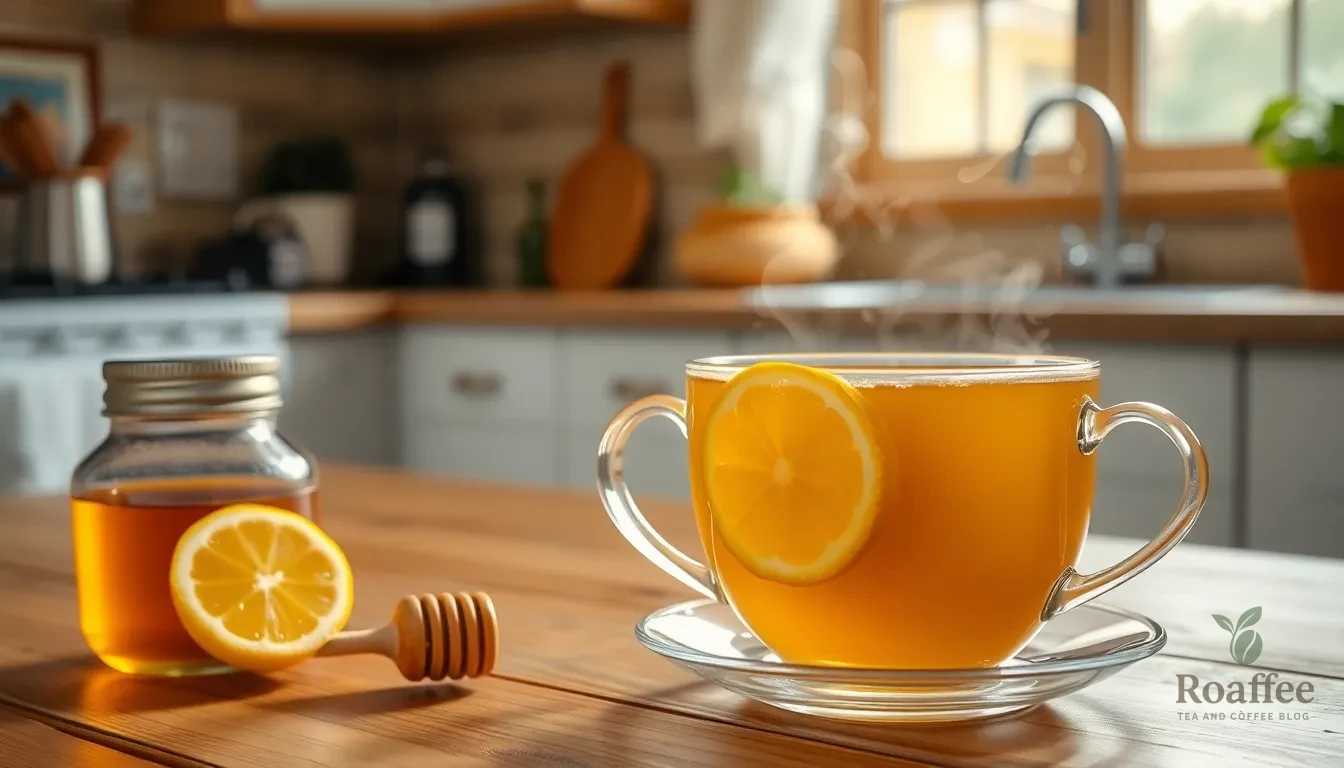
The optimal way to serve singer’s tea involves careful attention to temperature and timing for maximum vocal benefits. We recommend serving the tea at a comfortably warm temperature that allows you to sip slowly without burning your throat. This gradual consumption enables the therapeutic compounds to coat your vocal cords effectively.
We suggest sipping the tea slowly rather than drinking it quickly to allow the soothing effects to work on your throat and vocal cords. Each small sip should be held briefly in your mouth before swallowing to maximize contact with throat tissues. This technique ensures that honey and herbal compounds create a protective coating on your vocal cords.
Adding fresh lemon slices provides additional throat cleansing benefits beyond the basic recipe. We recommend squeezing half a lemon into your cup for enhanced vitamin C content and natural acidity that helps break down mucus. The citrus also adds a refreshing flavor that complements the herbal blend perfectly.
Adjusting honey levels according to your taste preferences allows for personalized sweetness while maintaining therapeutic benefits. We typically start with one tablespoon and add more as needed since honey serves both as a natural sweetener and an antibacterial agent. Some singers prefer a more robust honey flavor for enhanced throat coating properties.
Timing your tea consumption strategically maximizes its vocal health benefits. We recommend drinking singer’s tea warm before singing sessions to prepare your voice and immediately after performances to begin the recovery process. This approach helps maintain vocal flexibility and prevents irritation from developing into more serious vocal issues.
For daily maintenance routines, we suggest enjoying singer’s tea as part of your morning or evening ritual. Regular consumption helps maintain consistent throat hydration and provides ongoing protection against vocal strain. Many professional singers incorporate this practice into their daily schedules regardless of performance commitments.
The caffeine free alternative blend works particularly well for evening consumption when you want throat soothing benefits without stimulation. We recommend this variation before bedtime to promote relaxation while continuing to support vocal health throughout the night.
Storage and Make-Ahead Tips
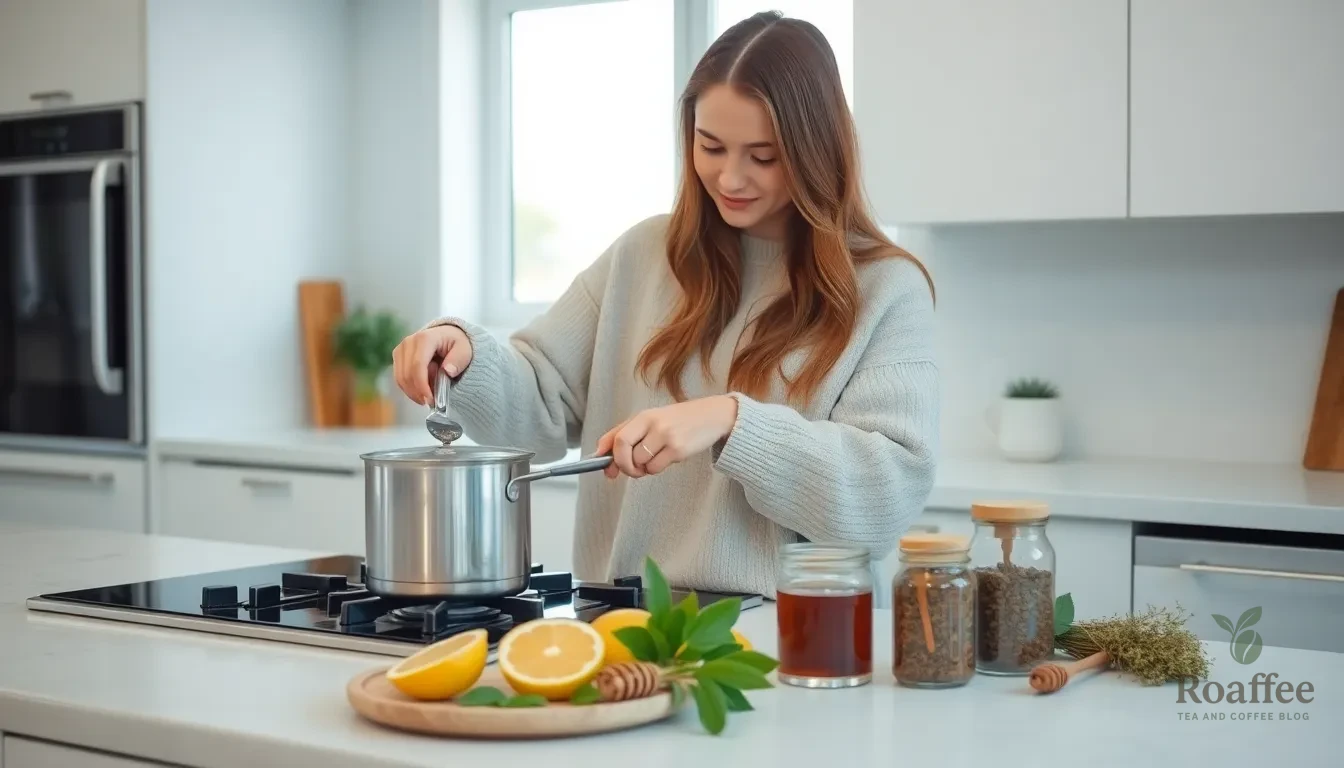
Planning ahead with your singer’s tea preparation saves time and ensures you always have this vocal remedy ready when needed. We recommend preparing the ginger base or herbal infusion in advance and storing it in the refrigerator for up to 2-3 days. This make-ahead approach allows you to simply reheat the concentrated base gently before serving.
Prepare Components Separately for Maximum Freshness
Storage works best when we keep the syrupy components like honey, apple juice concentrate, and lemon juice separate from the herbal base. Adding these fresh ingredients when serving preserves optimal flavor and maintains the therapeutic benefits of each component. Heat can destroy beneficial enzymes in honey, so we add it only after the tea has cooled slightly.
Use Tea Infusers for Convenient Brewing
Tea infusers or bags make the brewing process much more convenient and allow for easy cleanup. We can prepare fresh cups as needed without dealing with loose herb particles. This method also makes it simple to adjust the strength of individual servings based on your vocal needs.
Smart Storage Methods
| Storage Method | Duration | Best For |
|---|---|---|
| Refrigerated herbal base | 2-3 days | Pre-made concentrate |
| Separate honey storage | Room temperature | Preserving enzymes |
| Dry herb blends | 6-12 months | Bulk preparation |
Batch Preparation Strategies
We can create larger batches of dry herbal blends using the alternative caffeine-free recipe with chamomile flowers, mint leaves, hibiscus flowers, lavender buds, and star anise. These dry blends store well in airtight containers for 6-12 months and provide quick access to singer’s tea whenever needed.
Reheating Guidelines
Gentle reheating preserves the therapeutic properties of your prepared tea base. We recommend using low heat and avoiding boiling the stored concentrate, as excessive heat can diminish the healing compounds. Adding fresh lemon juice and honey during reheating restores the tea’s full vocal benefits.
When to Drink Singer’s Tea

Understanding the optimal timing for consuming singer’s tea maximizes its therapeutic benefits and supports vocal health throughout different stages of performance and practice. We recommend exact timing patterns based on your vocal activities and needs.
Before Singing Sessions
Consuming singer’s tea 30-60 minutes before vocal practice or performance prepares your voice for optimal function. The warm liquid helps hydrate your vocal cords while the anti-inflammatory compounds begin working to reduce any existing throat irritation. We suggest sipping the tea slowly during this pre-performance window to allow the honey to coat your throat and the herbal ingredients to take effect.
During Rehearsals and Recording Sessions
Active vocal work benefits from consistent hydration and throat support throughout extended periods. We recommend keeping a thermos of singer’s tea nearby during rehearsals or recording sessions to maintain moisture levels and clear any developing mucus. Taking small sips between songs or during breaks helps sustain vocal clarity and prevents the dryness that can lead to vocal strain.
After Performance or Practice
Post-vocal activity represents the most critical time for voice recovery and healing. We advise drinking singer’s tea within 30 minutes of finishing your vocal work to soothe any inflammation and begin the healing process. The chamomile and licorice root components work effectively during this recovery period to reduce swelling and calm irritated tissues.
When Experiencing Vocal Symptoms
Singer’s tea serves as an immediate remedy when you notice early signs of vocal distress. We recommend increasing your consumption frequency to every 2-3 hours when experiencing sore throat, cough, or cold symptoms that impact your voice. The concentrated ginger and honey combination provides rapid relief while supporting your body’s natural healing mechanisms.
Daily Maintenance Schedule
Regular consumption supports long-term vocal health even when you’re not actively performing. We suggest incorporating singer’s tea into your daily routine by drinking it once in the morning and once in the evening. This consistent approach helps maintain optimal throat moisture and provides ongoing protection against environmental irritants that can affect vocal quality.
Seasonal and Environmental Considerations
Dry climates and seasonal changes often require adjusted timing for singer’s tea consumption. We recommend increasing frequency during winter months when indoor heating reduces air moisture, and during allergy seasons when inflammation risks are higher. Air-conditioned environments also benefit from more frequent tea consumption to counteract the drying effects on your vocal tract.
Conclusion
We’ve shared everything you need to create this powerful vocal remedy that professional singers have trusted for generations. With simple ingredients from your pantry and our detailed recipe variations you can now create the perfect blend for your exact vocal needs.
Whether you’re preparing for a performance recovering afterward or maintaining daily vocal health this natural tea offers superior benefits compared to commercial throat remedies. The beauty lies in its simplicity and the ability to customize each cup based on your immediate requirements.
Start brewing your singer’s tea today and experience the difference that natural healing ingredients can make for your voice. Your vocal cords will thank you for choosing this time-tested remedy that delivers both immediate relief and long-term vocal wellness.
Frequently Asked Questions
What is singer’s tea?
Singer’s tea is a time-honored herbal remedy specifically designed to heal and protect vocal cords. It combines honey, fresh lemon juice, ginger root, and various healing herbs to create a powerful blend that soothes the vocal tract, reduces inflammation, and maintains vocal health for professional singers and anyone seeking throat relief.
What are the main ingredients in singer’s tea?
The essential ingredients include honey for antibacterial properties, fresh lemon juice for vitamin C, ginger root for anti-inflammatory effects, and healing herbs like chamomile, peppermint, and licorice root. These ingredients work together to reduce swelling, provide moisture, and create a protective coating for the vocal cords.
How does singer’s tea benefit vocal health?
Singer’s tea reduces inflammation in vocal cords, provides immediate hydration, and delivers therapeutic compounds that soothe irritated throat tissues. The anti-inflammatory properties from ginger help preserve voice quality and range, while ingredients like honey and warm water maintain vocal flexibility and prevent dryness that can damage vocal cords.
When should I drink singer’s tea for best results?
Drink singer’s tea 30-60 minutes before singing sessions to prepare your voice, keep it handy during rehearsals for consistent hydration, and consume it within 30 minutes after performances for recovery. For daily maintenance, incorporate it into your morning or evening routine to support long-term vocal health.
How long can I store prepared singer’s tea?
The ginger base or herbal infusion can be stored in the refrigerator for up to 2-3 days. Keep honey and lemon juice separate from the herbal base to preserve flavor and therapeutic benefits. Dry herbal blends have a long shelf life and can be prepared in batches for quick access.
Can I make singer’s tea ahead of time?
Yes, you can prepare the ginger base by simmering fresh ginger root slices for up to 45 minutes and storing it in the refrigerator. Prepare dry herbal blends in advance for convenient brewing. Add fresh honey and lemon just before serving to maximize therapeutic benefits and flavor.
What equipment do I need to make singer’s tea?
You’ll need basic kitchen equipment: a large saucepan, teapot, tea strainer, sharp knife, measuring cups, and a glass jar with a tight-fitting lid for mixing and steeping. Most households already have these items, making the brewing process simple and accessible.
Are there different variations of singer’s tea?
Yes, there are three main variations: a pre-performance blend with ginger and peppermint for energy and preparation, a post-performance recovery tea with chamomile and licorice root for soothing, and a daily maintenance recipe with simplified ingredients for consistent vocal care and hydration.












